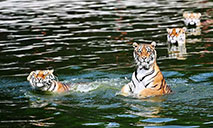Global search for virus natural resevoirs urgently needed: Chinese researchers
BEIJING, Aug. 2 (Xinhua) -- A global search for natural reservoirs with the potential to carry SARS-CoV-2-like viruses is urgently needed, Chinese researchers said in a research paper.
The world has witnessed the emergence of novel pathogens at an accelerating rate in recent years, most of which are zoonotic pathogens including coronaviruses. It is crucial to learn from the history of virus origin-tracing, such as with the bird flu virus and HIV, said Chinese researchers from the Chinese Academy of Sciences, Chinese Center for Disease Control and Prevention, Tsinghua University and other institutions in a paper.
The paper has been posted on the pre-print platform ChinaXiv.
The researchers pointed out that the progenitor of the virus, which has a strong similarity to the COVID-19 virus, must be found from a geographically and ecologically relevant animal before conclusions can be drawn.
Meanwhile, the origin tracing must not rush to a conclusion before accumulating sufficient evidence, and the fact that the location of the first outbreak might not be the place of origin must be kept in mind.
According to the World Health Organization-convened Global Study of Origins of SARS-CoV-2: China Part, direct zoonotic spillover is considered to be a possible-to-likely pathway. Therefore, a global search for natural reservoirs with the potential to carry SARS-CoV-2-like viruses is urgently needed, noted the paper.
SARS-CoV-2, the virus that causes COVID-19, and SARS-CoV-1, which caused the 2003 SARS outbreak, are related to each other. Both SARS-CoV-1 and SARS-CoV-2 belong to a group called the sarbecoviruses. A number of sarbecoviruses have been discovered from bats of the Rhinolophus genus.
The paper pointed out that, while Rhinolophus bats are considered the potential reservoir hosts of the virus, a range of possible intermediate hosts has been considered, with pangolins and minks attracting more attention than others.
Pangolins have been found to host at least two types of coronavirus that are closely related to SARS-CoV-2. Minks might also be an intermediate host because the only reported SARS-CoV-2 outbreak in animals occurred in the mink population in Europe. This indicates that SARS-CoV-2 is well adapted to minks, and minks might have played an important role in the evolution of the virus.
The cross-species transmission of SARS-CoV-2 from the reservoir host to the intermediate host requires that the two hosts live in proximity and share ecological links. Considering the potential reservoir host and intermediate hosts, the location of origin of SARS-CoV-2 could be in regions where the distribution of Rhinolophus bats overlaps with that of pangolins, minks, or other potential intermediate hosts.
They then mapped the overall distribution area of 98 Rhinolophus bat species, eight pangolin species, and the wild European mink, together with the main distribution area of mink farms, and marked the locations where bat SARS-CoV-1 and SARS-CoV-2 were discovered, along with international flight routes to Wuhan.
The data suggest multiple locations worldwide where SARS-CoV-2 could be transmitted from its natural reservoir to intermediate hosts.
The virus spillover from bats to pangolins could occur in Southeast Asia, southern China, India and sub-Saharan Africa, while cross-species transmission from bats to minks could occur in southern Europe. Both transmission routes could eventually lead to the adaptation of the viruses and potential human infection, said the paper.
It noted that surveillance of the viruses needs to be conducted in Rhinolophus bats, pangolins, and minks from the above-mentioned regions before determining the place of origin of SARS-CoV-2.
A lab incident that led to the SARS-CoV-2 outbreak is extremely unlikely, said the paper, calling for collection of more evidence to identify the origins, intermediate hosts, and transmission paths of SARS-CoV-2.
The researchers said that tracing the origins and intermediate hosts of a virus is a difficult task. A solid conclusion would be the result of an enormous amount of work, patience, global cooperation, some luck, and possibly decades of continuous research.
Photos
Related Stories
Copyright © 2021 People's Daily Online. All Rights Reserved.










